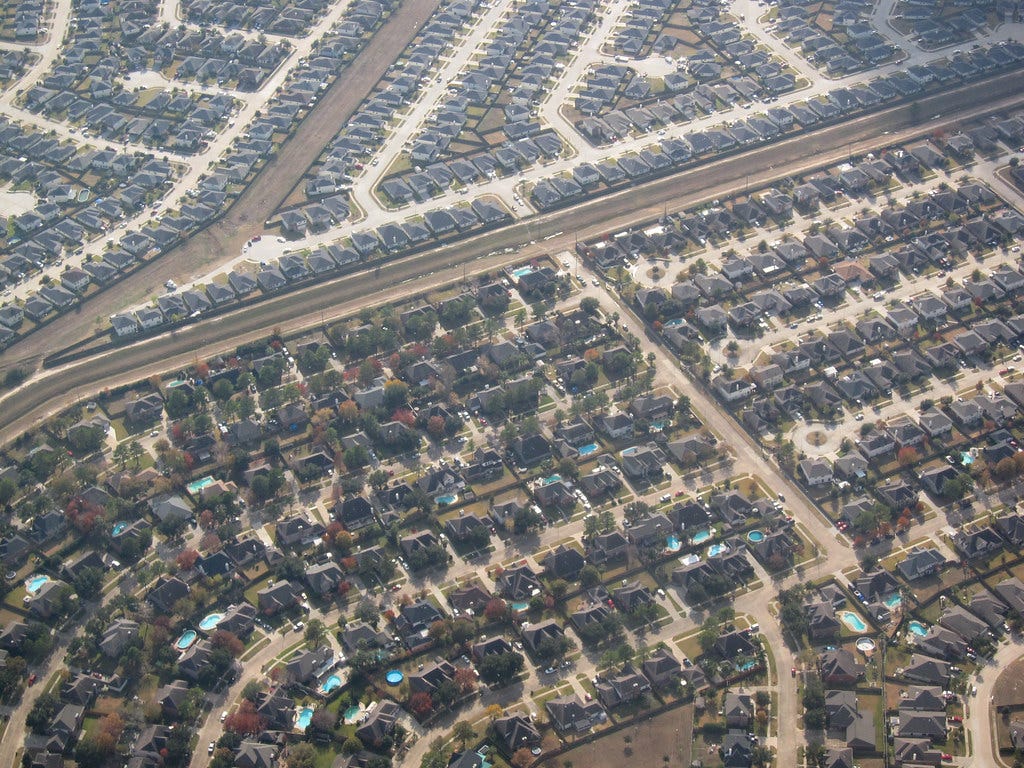New BiggerPockets Article: Are the Suburbs a Soul-Crushing Abomination?
Part 2 of my 3 part series on the American suburb

This is an excerpt from an article originally published on BiggerPockets.com.
For part one of this series, see here.
In my previous article on the uniquely American suburbs, I delved into their controversial history. Here, I’ll focus on the political and social critiques of America’s particularly car-centric and sprawled form of suburban development. A third and final piece will look at the financial picture, as well as the suburbs’ viability, both for the country and investors.
Conspiracy theories that the suburbs were created to drive demand for automobiles are, for the most part, backward. It was, in actual fact, the mass adoption of the automobile that drove the creation of the suburbs. Of course, big business (Levittown) and government policy (the creation of the interstate highway system and urban renewal) also played a part in the expansion of America’s car-centric suburbs.
But even if the causes of America’s suburban sprawl were completely benign, that doesn’t mean that the suburbs as currently constituted are good nor sustainable nor a place for quality, long-term investments. It is to these questions we now turn.
Evaluating Critiques of the Suburbs: The Suburbs Are “Soulless”
One of the major critiques of the suburbs is that they are “soulless.” In other words, as Alex Balashov puts it in Quartz, “it’s designed for cars, not humans.” He continues:
“Far from posing a mere logistical or aesthetic problem, it shapes—or perhaps more accurately, it circumscribes—our experience of life and our social relationships in insidious ways… For just one small example of many: Life in a subdivision cul-de-sac keeps children from exploring and becoming conversant with the wider world around them, because it tethers their social lives and activities to their busy parents’ willingness to drive them somewhere. There’s literally nowhere for them to go. The spontaneity of childhood in the courtyard, on the street, or in the square gives way to the managed, curated, prearranged ‘play-date.’ Small wonder that kids retreat within the four walls of their house and lead increasingly electronic lives.”
This perspective is so ingrained that TV Tropes actually list the cut-and-paste suburb as a common cliché in TV and film, saying: “In fiction, especially animation and comics, the similarity will get ramped up: The houses, gardens, and cars will be identical. The lives of the residents may also be identical…” Think Stepford Wives, Pleasantville, and American Beauty.
While I think there’s a grain of truth to this, it’s wildly overstated. Social atomization and the much-discussed lack of community may have been aided by growing suburbanization, but it certainly wasn’t a major cause.
…
To read the read the rest, please visit to BiggerPockets.com.
You can find my other book, Awesomeness, here.
And the audiobook here.
And please subscribe to my YouTube channel.



Damn, this is a great one.
I think the big negative stereotypes about the suburbs come a lot from media and aren't based in much reality. People moved to them because they wanted space for a family and it was affordable, safe with good education options. They aren't as affordable now, but if you want a family nothing comes close to a suburban home other than if you want to live a more rural life which is rare.
Media is made by people in big cities who aren't focused on rising a family, that idea of moving to the suburbs would seem like hell for them, so they find the "bad" things about it to portray in the media and skip over any of the good stuff except for nostalgia (Wonder Years.) The media they make justifies their feelings about "Suburbs bad" even if their portrayal isn't very real. Its a total outsider's take on what a suburb is like to live in and why the creator of the media doesn't want to live there.
Things like a lack of public transport which is so often talked about why urban areas are losing to suburbs, just aren't family friendly and don't make for a good living situation in the urban core for a family anyway. It is just an amenitiy for the same people who would make media about how lame suburbs are. It will increase how many people who don't fit the suburban demographic to jump back into the urban core, but it wont make families desire living in the city.
On crime, even if there is more crime in suburbs being further away from people, you wont be confronted with it as often (your neighbor being the victim of a crime is less likely if you have less neighbors) so it will feel nicer to most families.
There are cons to suburbs, but the dread of them doesn't come from the people who want to live in them which is most Americans.
Also when you pointed out "The marriage rate per 1,000 women has fallen from 76.5 in 1965 to 31.2 in 2022." This is a terrifying statistic!